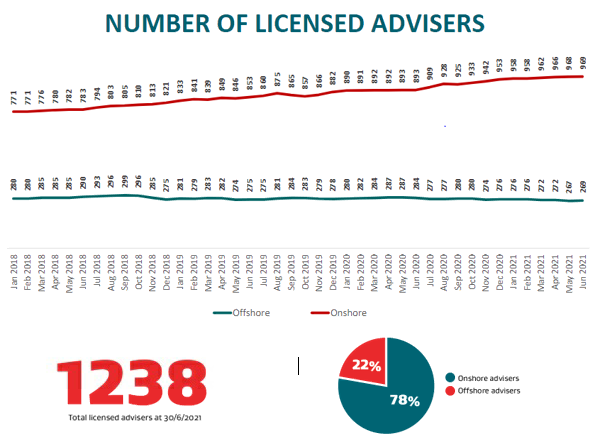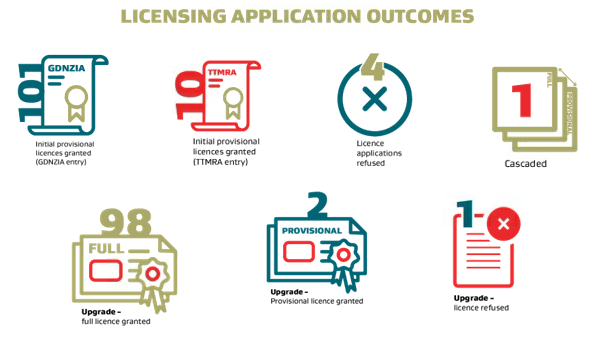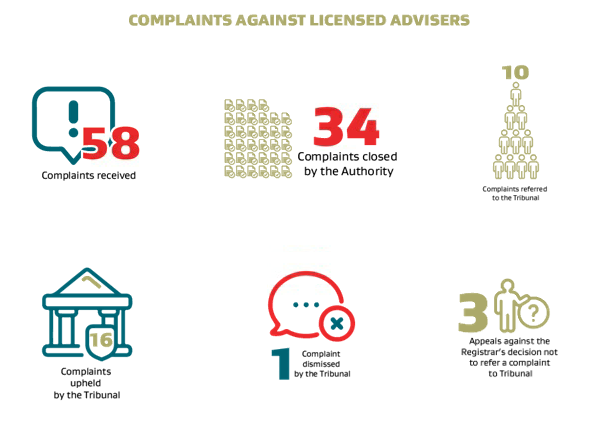September 2021 Newsletter
Message from Registrar
Kia ora
As I write this message, Auckland is at Alert Level 4, with the rest of New Zealand at Alert Level 2.
You can keep up to date with the latest information, including changes in Alert Levels within New Zealand, operating a business during the various alert levels and financial support available on the Government’s COVID-19 website.
COVID-19.govt.nz(external link)
As our team is mostly based in Auckland, we continue to work remotely and the office cannot easily receive documentation that is sent by courier or mail. Online application services continue to be available and the team can receive paper-based applications via email, info@iaa.govt.nz.
During these challenging times, the Authority will continue to focus on supporting the licensing regime.
For guidance regarding meeting your CPD requirements and renewing your licence while we navigate the changing alert levels, please refer to the COVID-19 updates on our website, which are still are still current.
In our recent presentation at the Auckland NZAMI seminar, we acknowledged the overall volume of applications submitted to INZ reduced during the initial lockdown period last year. Though numbers aren’t at previous levels, the number of applications submitted by licensed advisers has increased. This shows that although border situations are changing, there is a continued benefit to consumers to receive specialist advice from licensed advisers, particularly when policies and immigration instructions change rapidly and at times, short notice.
During the NZAMI seminar in July, we also shared some statistics on the current numbers of licensed immigration advisers. Following on from that presentation, and to give you some further insight to the work of the Authority in both the licensing and complaints space, we have included some additional statistics, which you will find detailed later in this newsletter.
Since our last newsletter, we have extended our engagement with stakeholders to include current Graduate Diploma students, which we hope will enhance the knowledge of the regulatory regime amongst future licensed advisers.
We will continue to use our bi-monthly newsletter to keep you up to date with the work of the Authority, to address common issues encountered by the licensing team in the course of inspecting client records and to keep you updated with recent Tribunal decisions.
If you do not currently receive this newsletter by email, I encourage you to subscribe online.
Subscribe to the newsletter(external link)
Please remember to continue being kind to each other, as we continue to navigate these uncertain times and as always, keep our professional standards high.
Duncan Connor
Registrar of Immigration Advisers

2020/21- A year in numbers
The Authority has seen an increase in the number of licensed advisers based onshore over the last financial year (June 2020- June 2021) which has led to an overall increase in the number of licensed advisers. However, the total number of offshore advisers has remained relatively stable.

The figures below refer to the period 1 July 2020- 30 June 2021



2020/21 - A year in numbers
Number of licensed advisors
1238 Total licensed advisers at 30/06/2021
78% Onshore advisers, 22% Offshore advisers
Licensing application outcomes
101 Initial provisional licences granted (GDNZIA entry)
10 Initial provisional licences granted (TTMRA entry)
4 Licence applications refused
1 Cascaded
98 Upgrade – full licence granted
2 Upgrade – provisional licence granted
1 Upgrade – licence refused
Complaints about licensed advisers
58 Complaints received
34 Complaints closed by the Authority
10 Complaints referred to the Tribunal
16 Complaints upheld by the Tribunal
1 Complaint dismissed by the Tribunal
3 Appeals against the Registrar’s decision not to refer a complaint to Tribunal
Unlicensed persons
51 Complaints received
6 Prosecutions
2021 Licensed Immigration Advisers Reference Group
On 2 August the Reference group held their second virtual meeting for the year. The group focused on three topics: a preliminary discussion on the option of publishing IACDT decisions on the Authority’s register of immigration advisers, the usability and practicality of an updated Upgrade application form and a discussion on the usefulness of the current supervision toolkit and suggested improvements to content.
The minutes of the meeting are now published and available for review.
The next Reference Group meeting will take place on 4 October 2021.
Webinars
The recording of our recent live webinar, “Learning from others’ mistakes- Part 2” is now available to view. We have also provided a PDF version of the presentation for you to download.
If you are watching the recording as part of your mandatory continuing professional development (CPD), please remember to take a screenshot of the registration page as evidence of attendance, to keep with your CPD records.
We will be delivering another webinar before Christmas, the date will be announced in due course.
Message from Toi Ohomai
Graduate Diploma in New Zealand Immigration Advice (GDNZIA) Industry Partnership Group
Toi Ohomai Institute of Technology established a GDNZIA Industry Partnership Group in 2020. The group is made up of GDNZIA programme staff, an IAA representative, an INZ representative and licensed immigration advisers. The group is a forum for Toi Ohomai to share information about the programme with industry and for industry to provide feedback on issues relating to graduate outcomes and the content and delivery of the programme.
The 2021 licensed immigration adviser members of the group are:
- Asoka Weerasundara
- Bijendra Thapliyal
- Hinemoa Taylor
- Kristy Verster
- Thomas Tran
- Vanessa Sharratt
- Vinay Sood
If you have any feedback on the GDNZIA please pass this on to one of the GDNZIA Industry Partnership Group members. They can then share the feedback for discussion at our next meeting.
If you have any questions or suggestions about the GDNZIA, you can also contact me directly on – appley.boyd@toiohomai.ac.nz.
Message from Employment New Zealand
Government announces support to better protect migrants from exploitation
New measures to better protect migrant workers from exploitation came into force on 1 July 2021. The changes are part of a wider Government initiative to combat all forms of exploitation. These include:
- A new visa to support migrants to leave mistreatment and exploitative work situations quickly and remain lawfully in New Zealand. This visa will be valid for up to 6 months.
- A new dedicated 0800 number and web form to make it easier to report migrant worker mistreatment or exploitation at the workplace. Anyone who sees or suspects a breach of minimum employment rights can report it. It does not have to be the migrant being exploited.
- Combined efforts from Immigration New Zealand and Employment New Zealand Labour Inspectors to investigate non-compliant employers.
Please visit:
Reporting migrant exploitation – phone number and reporting form(external link) – Employment.govt.nz
Licensing matters
Answers to webinar questions
There were many questions submitted during the webinar and unfortunately, we were unable to answer all of them live. Below are answers to some relevant questions, which we were unable to address. These cover various aspects of the Code of Conduct 2014 (the Code).
Code of Conduct 2014 (the Code)
1. Is it OK for an LIA to have a CSA for SMC when the client does not currently meet eligibility for it? Can the LIA take fees in advance for this? Also, if the LIA does this as part of a WV/RV package, how does the client know what they can have refunded? Are such packages OK?
- Generally, if a client does not meet the eligibility criteria for the type of visa they have requested, then you should advise them accordingly, rather than simply entering into a written agreement to provide those services.
- Clause 9 of the Code states that if a proposed application is futile, grossly unfounded, or has little chance of success, then the adviser must advise the client of that fact in writing. If the client still wishes to proceed, the adviser must obtain a written acknowledgement from the client that they have been advised of the risks.
- If you have entered into an agreement with a client, you have the option of taking funds in advance, provided this is clearly explained to your client and is detailed in the agreement. If you do take funds in advance, those funds must be managed strictly in accordance with Clause 25 of the Code.
- When you charge fees, please bear in mind that all fees must be associated with specific services or piece of work. You can only invoice the client for services that have been provided. If you have taken funds in advance, you can transfer funds into your business account only after the services associated with that fee have been provided, and the client has been invoiced. The Code of Conduct Toolkit includes a flowchart on the process for receiving client funds in advance.
- Your written agreement must contain a refund policy (Clause 19(k)). The client will not necessarily know what can be refunded. However, they may approach you with a request for a refund, which you must consider on its merits, on a case-by-case basis. It is your obligation to ensure that if you do give a refund, the refund is fair and reasonable in the circumstances (Clause 24(a)).
- We are unable to comment on the acceptability of specific ‘packages’. It is important that you consider your client’s individual circumstances carefully before providing objective advice on their eligibility. You must tailor your client service agreement specifically to your client’s needs and circumstances, and you describe the services that you will be providing accurately, so that your client is aware of what they may expect.
- All mandatory written agreement clauses are set out in Clause 19 of the Code.
2. Can the IAA comment on the appropriateness of a non LIA being a director of a LIA firm? i.e. for lawyers a non lawyer cannot be a partner of a law firm. I view it would give better protection to clients.
- Under the Code of Conduct 2014, immigration advisers are personally responsible for providing advice to their clients. A non-licensed individual may be a director of a firm of immigration advisers; however, they are not allowed to provide immigration advice to clients under any circumstances.
3. Does the English translation have to be certified?
- If you are required to provide an English translation of one of your official application documents, such as a Police Clearance Certificate, then the translation must be certified.
- If you are providing a client file for inspection, then you can provide your own translation of the foreign-language documents. The assessor will contact you if anything is unclear, or if during the assessment process it is determined that a certified translation is warranted.
Incorrect use of Trade Mark
Over the last few months, we have noticed that many advisers are using the Trade Mark incorrectly. This includes, but is not limited to, the use of the Trade Mark on letterhead, websites (including social media platforms) and advertisements.
The most common mistakes include:
- Altering the appearance of the Trade Mark;
- Displaying the Trade Mark in a way, which gives the impression that the company, rather than the individual adviser, is licensed;
- Not displaying the adviser’s name and number in close proximity to the Trade Mark.
Please ensure that you are using the Trade Mark correctly, in accordance with Clause 32 of the Code.
For further information and guidance, please visit:
the Trade Mark Licence Agreement [PDF, 128 KB]
the Code of Conduct Toolkit- Trademark
Supervision agreements
Amendments to Professional Development Plans (PDPs)
If you wish to amend your PDP, you do not necessarily need to submit a special request to amend your supervision arrangement. You could incorporate the amendment (such as additional planned activities or new learning goals) in your Continuing Professional Development Plan for the current licensing period. Your CPD plan and record can be maintained online via the adviser’s portal.
Business details
Recently we have noticed that many provisional licence holders are submitting proposed supervision agreements without including their full business details in the ‘Personal details’ section. Please include the name of the business you work for, and your status with that business. This applies even in cases where one of the parties is self-employed. The information is important because, amongst others, it determines who must sign the supervision agreement.
Guidance on what information must be included in a supervision agreement is detailed in the Supervision Toolkit.
Tribunal Decisions
The Immigration Advisers Complaints & Disciplinary Tribunal has recently released the sanctions decision for TI v Malcolm. In the substantive decision of 8 June 2021, the Tribunal upheld the complaint finding that the Adviser, Timothy James Malcolm, had misled his client about the lodgement of her application and provided false updates. Although this was the Adviser’s first appearance in front of the Tribunal, it was noted:
“…The starting point is the seriousness of a finding of misleading conduct, having lied to his client. This is aggravated by [the Adviser’s] refusal to engage in the disciplinary process. He has failed to explain his conduct, or to apologise or express any remorse to the complainant, the Authority and the Tribunal. There can be no confidence that [the Adviser] has learned any lesson, or would change his practices if he was to regain his licence or would conduct himself honestly…”.
The Adviser was censured, prevented from reapplying for a license for two years, ordered to complete a professional practice paper prior to applying to be relicensed, pay a $2000 penalty, and refund the client $850.
Read recent Tribunal decisions(external link) – Justice website

